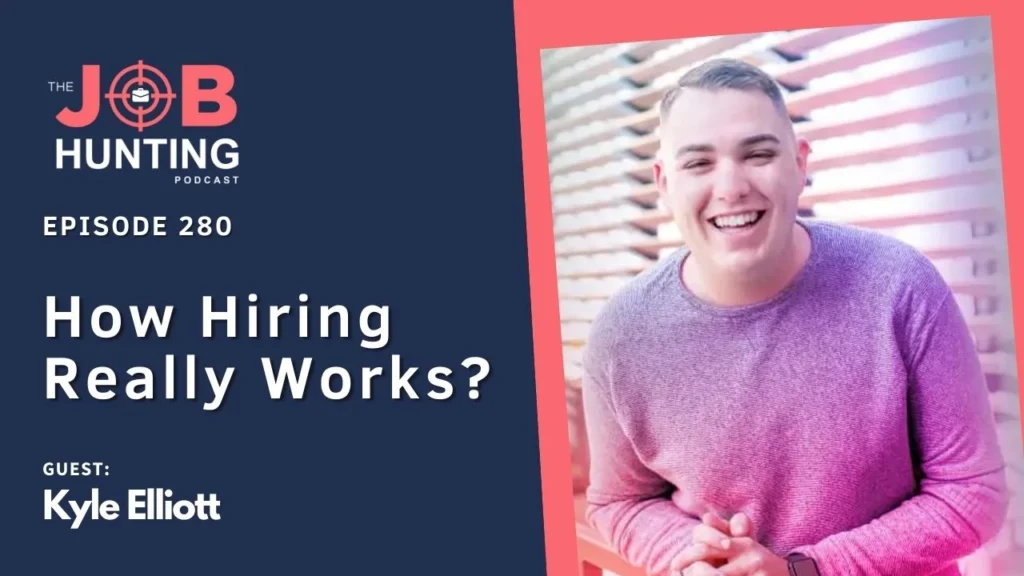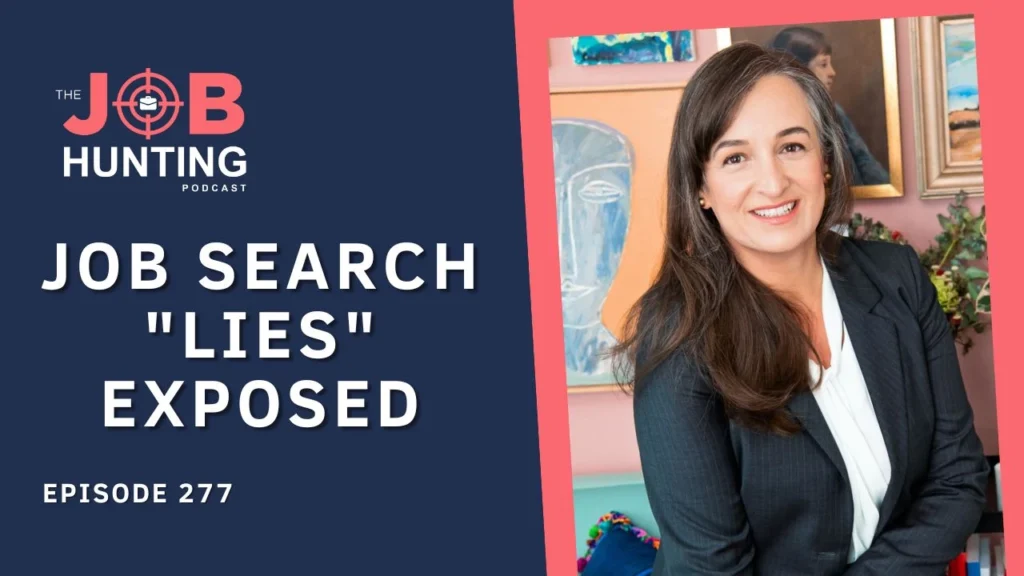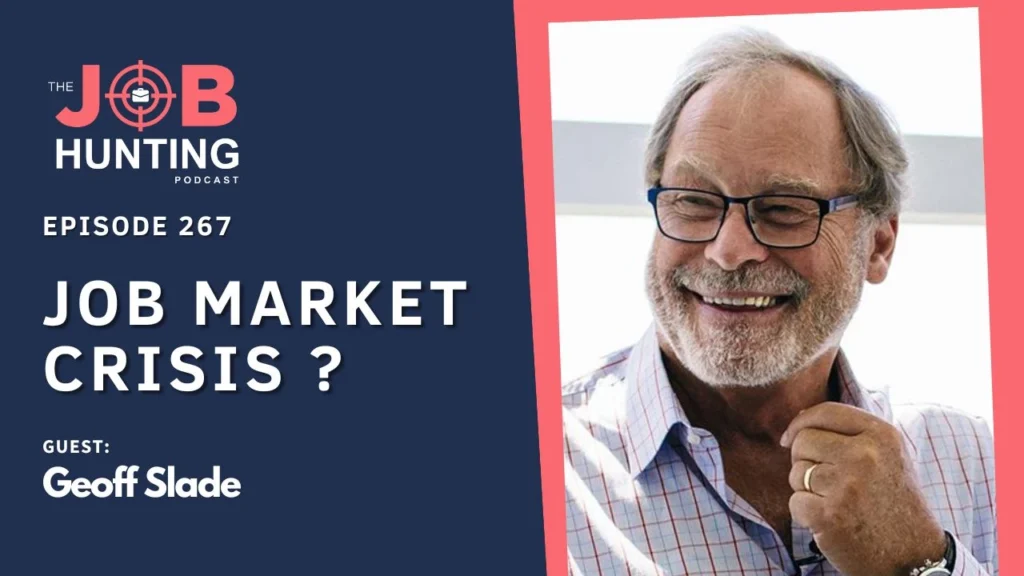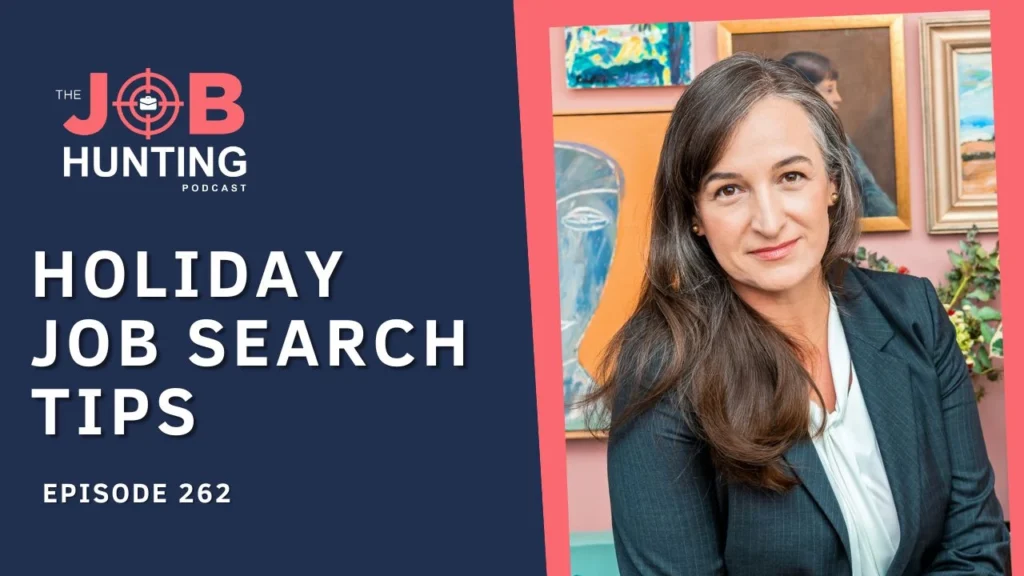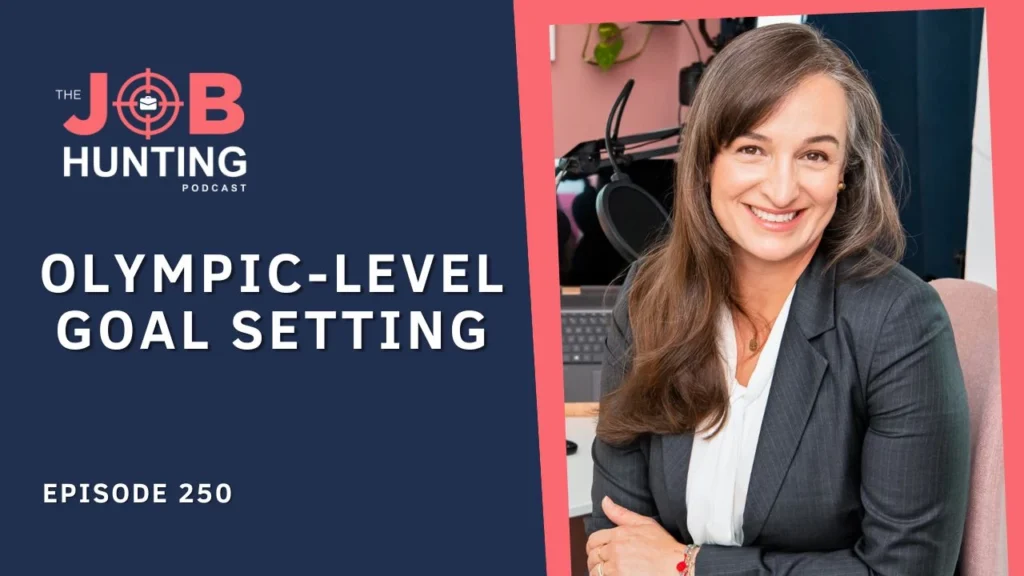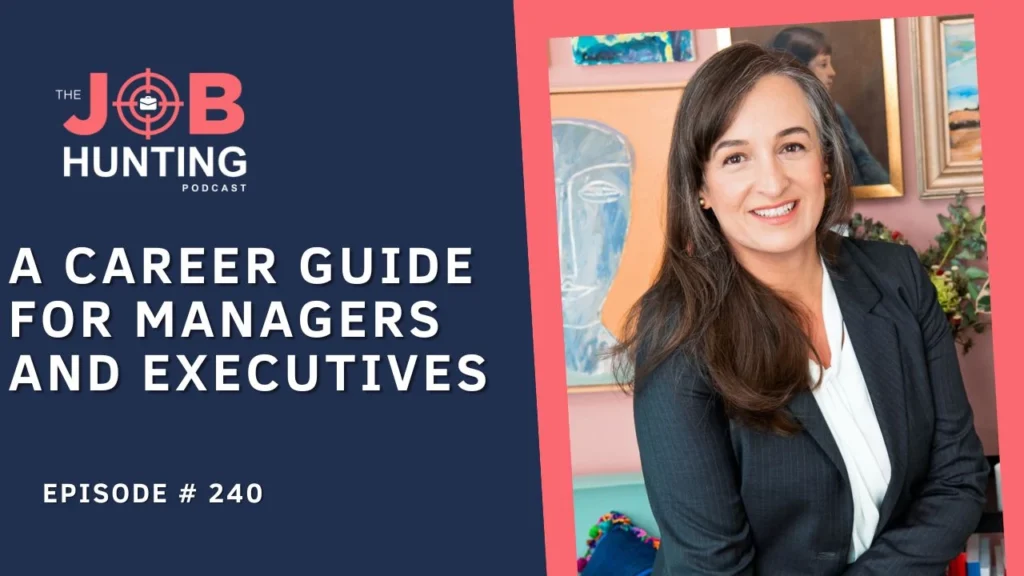Hello, and welcome back to the job hunting podcast. If you’re new here, I’m Renata Benadi. I’m your host. I’m a career strategist. I am the founder of this podcast, and I designed lots of services to help professionals, usually in their 40s, 50s, and 60s, with their career transitions, advancements, or finding more fulfillment at work.
I didn’t think this topic was relevant for my audience, this topic of today, career counseling versus career coaching, until recently. And now I feel, a little bit dumb because it’s really important. Sometimes something is so, um, I normalize it and it’s so obvious to me, but I think my audience may want to know.
And I want that to be very clear for you as well. So what’s the difference between career coaching and career coaching? Counseling. You may be wondering which one you need at this point, if you’re listening to this podcast and also in this point of your professional life, especially if you’re facing a career change or feeling uncertain about your next steps.
It’s an important distinction and getting the right support for you can make a huge difference in your pocket so that you don’t invest in things that you don’t need. But also, uh, In the next steps that you take. So in this episode, we’re going to dig into what career coaching and career counseling are, when you might need one versus the other, and how to make an informed choice about what’s best for you.
But before we discuss that, this key topic of today. I usually ramble about a couple of other things that are on my mind as well. And just this morning before recording this episode, I was looking at my goals for 2024. Now I’m recording this in September 2024. So it’s been nine months since I set goals for myself.
And isn’t it funny? I mean, have you had the opportunity to review your goals? I don’t know if you’ve written them down or if you just thought about them and How are you progressing with your goals? I reviewed mine and I was really surprised. I achieved some much sooner than I thought, but then others, I haven’t even started.
So now it’s a matter of do I sprint to get some of Some of my key goals done and then I wanted to postpone one and I postponed it so I changed it to 2027, sorry 2025, look at me skipping a couple of years. Um, by the way, I write them on my notes on my iPhone. I know that there are probably better ways of doing this, but I just find that the notes is easy for me.
And. You know what? I deleted the goal. I didn’t even postpone it to 2025. I think it’s a goal that I want to do, but I have just realized that it’s much longer term than I thought. It’s not for this phase of my life and career, so I deleted it. I am reminded of it all the time. It’s, you know, it’s basically going back to piano.
I’ve been postponing this for a long time, but I have a piano in my kitchen, so, not my kitchen, my living room area between my, my living room and my kitchen. The piano is there to remind me every day as a, it’s probably bad feng shui that, you know, I have that reminder of something I want to fix. I don’t think it’s bad.
But sometimes we. are overly optimistic about achieving things in life and I know, I know I will play piano again. It’s just not right now. It’s not the thing that I need right now. So I deleted it from my, my planning, my life goal, um, note taking for now. But I was surprised that I had achieved something that I thought was really difficult.
And then there’s something else that I didn’t think it was going to be that difficult, but I just haven’t, I tried and tried and tried, but I haven’t managed to do it. And now I want to do a big sprint between September and December to see if I can make any, you know, shift the dial on this a little bit more.
So this is, um, something that I would like you to consider, you know, reviewing your goals, um, or doing a little sprint with me between now and the end of the year. And if you decide to do that, please send me a DM on one of my social media apps, LinkedIn or Instagram. Let me know what you’re doing. I would love to know what you’re sprinting for.
Also. Um, I’m always, you know, impressed at how many things get in the way of us doing things, right? So, if you’ve been following me and listening to my podcast, you know I had a bad cold. If you’ve signed up for the newsletter, you definitely know I can’t stop talking about it. And in fact, I still have a cold.
a different voice from coughing and having this cold for almost a month now. Um, so that made me postpone some of my projects that I had for August, July, August. And then, um, and then the lack of sleep. Then I’m thinking, no, now I need to go back to sleeping more now that I’m not so sick. And then the painter is now painting the house and the fumes are killing me.
killing me, giving me terrible headaches. So, oh, I can’t do my project because I now have this headache. But there’s always an excuse in life. I could just go on and on and not do these projects that I need to do. These are life projects. These are work projects. But at some stage, I need to draw the line.
At some stage, I need to stop giving myself excuses to justify what I don’t want to do or what is in my too hard basket and just decide, do I want to move forward with this project or not? Am I going to do it or not? So I was just wondering if this is something that you can relate to as well. I find that, you know, especially when I’m working with clients for the first time, or if it’s a consultation, there’s a lot of things that get in the way of them getting the outcomes that they want to in their life.
And what we’re trying to do is sort of shred that away, just file that away, um, if possible, or reconsider their goals and their targets. Sometimes we might just be justifying. Not doing things we don’t want to do and this is, you know, an important thing to reflect on. So I’m doing that right now at the moment as well.
All right, so let’s go into the topic of the day. I describe myself as a career coach. If you sign to my newsletter, you know that that’s what’s at the bottom of the newsletter. That’s my signature. It’s Renata Bernardi, career coach. Um, so yes, I describe myself as a career coach, not as a career counselor, but from time to time I do.
career counseling for my clients as well. It’s part of my services, it’s part of being a good coach for them, is doing some career counseling as well. But here’s the message that I received. I’m going to read it out to you and then I’m going to read it out to you, my response as well, because I think this is such an interesting message.
piece of information that you may benefit from knowing. So the person wrote to me, Hi, I am looking at transitioning into a new career and I wanted to chat about potential career paths. I have been working as a professional, I’m not going to say what it is because I want not to identify the person, um, use whatever word, professional marketing manager, professional physiotherapist, whatever, for over 20 years with some Other work, you know, um, on the side, I have started the process and have an offer to do a master’s in teaching, but would like to explore all offers before committing.
I think she meant all options before committing. Would you recommend doing the strengths assessment with you? That’s my Find My Talent service, or is this covered in a one on one consultation? Now that, I had to think about how I was going to answer this, and this is how I answered. Thank you for reaching out and sharing a bit about your career journey.
It sounds like you’re on an exciting crossroad, and I’d be happy to help you explore your options, but to clarify, I’m a career coach, which means I focus on helping professionals like yourself develop strategies for career transitions, advancement, or fulfillment. Career coaching is a bit different.
different from career counseling, as I work with people who are looking to set clear goals and develop actional plans for a career that they have already chosen, rather than offering support for individuals who are not sure what they want to do professionally. Career coaches like me, we focus on your strengths and experiences and the market, the job market, to create a plan.
practical path forward. If you’re looking to understand your strengths and how they can play into your next move, that is certainly something we can cover in a one on one consultation. The strengths assessment is more self guided, but I recommend a consultation if you’d like um, a more personalized guidance tailored specifically to your situation.
Let me know if you’d like to book a session or if you have any questions. So, What I’m trying to say here, if, if, if she has no clue what she wants to do next, I’m probably not the right person for her. I don’t know if I was clear enough in my answer. I don’t know. Let me know. But let’s sort of dive into what career counseling is.
Okay. So career counseling is often It’s an expertise and a career counsellor typically helps individual, individuals explore their interests, their personality traits, and their skills to guide them into a career path. You will see career counsellors in high schools, in universities, helping younger professionals find their career paths.
That’s a myth though, that only young people need them. More mature and experienced professional like this woman, she may also need to kind of reevaluate her, the road, the path that she’s in and figure out maybe a completely career path for her. Um, I don’t think I don’t have the expertise to help her.
These are specific assessments that people do that will just show up. You know, these are the sort of professions that would relate to the strengths that you have. I don’t do that. So if you’re feeling completely lost and unsure about what career might suit you, a career counselor might use these assessments to help identify your strengths and challenges.
They may also help you understand how your personal issues. Maybe lack of confidence or fear of change, maybe influencing your career decisions. So, you know, very good at doing that. And they tend to focus on doing that deep reflection, getting in touch with your emotional, um, aspects of what you’re trying to achieve, maybe some other external influences, usually parents, if the career counsellors are working with younger people, that might be influencing the decision instead of the person’s talents and, and, and wants.
and wills and needs and all of that. So, this is like a really beautiful work. Um, it can be quite emotional and, and, you know, it, it can sort of help people overcome mental barriers and so forth. So, it’s a really interesting work. Career counselors, they’re trained in psychology and counseling and they, they’re, they’re often working in educational settings, which may be a problem because, Sometimes I think older professionals may also benefit from talking to a career counsellor and starting from scratch, basically, which is what I think this person that contacted me wanted to do.
And they are better equipped to deal with that than somebody like me. I, I’m an expert in something else which I’m about to, to talk to you about, but if you’re finding yourself saying, I’m not sure anymore, like I don’t know, I don’t want to do what I’m doing. I want to do something completely different. I don’t know what it is.
I need some help to identify opportunities. That starting from scratch doesn’t have a hypothesis. See, I work with hypotheses. With this career counseling work, it’s like, grounded research work. Like there’s no way, we were going to talk about this in another episode for sure, but like there’s nothing guiding you.
You can start from scratch. It’s beautiful. It’s really interesting and exciting. Um, do I do career counseling for my clients? For sure I do. Is it the reason why they start working with me in the first place? No, definitely not. So often they come to me wanting a job, a better job or any job. You know, they want career advancement.
They are ambitious or you know, they want just career sustainability and to find work but they are struggling with the techniques, you know, the strategy behind finding a job. So, I like to give people the power of taking control of their careers, but what happens is that when we start to explore and understand the barriers that they’re facing, understand their interests and their values and their skills, and start developing long term plans for them.
Sometimes it becomes clear that my clients may feel unsure about the direction that they’re taking which can affect negatively their job search, right? So if you’re looking for work but you hate your job and you hate what you do, I mean this is really, um, Quite sort of extreme, but you know, I need just to give you an example of what it means.
Like if you’re looking for a job, but you really don’t want a job, um, then it will come up in the career coaching sessions and then career counseling steps in. And then we will, we will start working on some hypotheses, some options so that we use some of the expertise that this person has developed over time to lead them into different areas.
where they can explore different career paths and different types of work that might be more purposeful for them. So for sure, there’s a little bit of counseling there. Um, and then I would provide support as they navigate those career decisions. We use the Find My Talents assessment. Of course, I love the Talent Predicts assessment, which is my Find My Talents service.
on my website if you’re looking. And then we, you know, then, then we look into educational options, which I think is a really, really great place for this person who just contacted me not to sign up for the Masters of Teaching before really considering what she wants to do, because the last thing you want is to spend a lot of money in the Masters of Teaching and then realize you don’t want to be a teacher.
So you need to sort of be strategic first and then do the educational options and do that investment, which is usually a much bigger investment than working with a career counselor or with a career coach. So, what is career coaching then? Now, let’s switch gears and let’s talk about career coaching. I’ve been a career coach for several years now, and my work is focused on helping professionals who are navigating career changes.
So, things that are happening in their career. So, whether that’s looking for a new job, or aiming for a promotion, or trying advancement, or trying to find more fulfillment in their current role, um, career coaching is much more. action oriented. And like I said, we start with some hypothesis, some options. Do you want to stay in this current career?
And sorry, this current job that you have? Or do you want to go a step above or a step below? You know, do you want to maybe change sectors or industries? So, you know, There are some hypotheses there, and we play around with that. While I, like I said, I do help my clients reflect on their values and their strengths, the focus is on setting goals and developing strategies to achieve them.
It’s more pragmatic and more practical. We work on those practical steps like You know, once we identify which option we’re going to go forward with, we optimize the LinkedIn profile for that option, we start preparing for job interviews for that option, we start doing the network more effectively and more strategically, and start creating a personal brand that fits into the option that they have chosen.
So career coaches, What they will help you look ahead and identify those opportunities and make decisions that are going to move you forward in your career and forward is not just moving upwards, it’s remaining relevant in your area of competency. Even with all of the changes that are helping in the world of work and in your profession.
Some clients want career advancement. All of them need career sustainability. For me, what that means is you feeling secure in the knowledge that you will always be able to find work throughout your working life. Because you have the competencies that employers are looking for. And that’s where career coaching, I think, can be absolutely instrumental.
So if you’re thinking, I know what I want, but I’m not sure how to get there, or I need a solid plan to transition into a new role, then that’s career coaching that you might want to invest in. The key difference here is that coaching is less about exploring those deep rooted psychological barriers and more about actionable steps that you can take to achieve your career goals.
So we focus on how, um, and then we may touch on why, if we feel like we need to as well. So who needs career counseling and who needs career coaching? Where career coaching tends to focus more on action and goal setting and strategy, career counseling dives into that deeper reflection and often addresses emotional or mental aspects tied to work, such as your career identity, motivation, and so on.
Um, But, what I feel that is a myth that we need to address is that career counseling is for younger people and career coaching is for older people. That is not true. And last week was this perfect example to me, that’s why I decided to record this episode, that that is not true. For example, a very young member of my family called me and, you know, we spent a lot of Over an hour on the phone and I thought he needed career counseling, but he made it very clear for me that he needed coaching.
What I mean by that is that he knew what he wanted. He was happy in his chosen profession. He was happy in the choice that he had made for his employer, but he wasn’t progressing in the way that he assumed he would, you know, and then, you know, once I kind of understood that, okay, he is He’s so young, but he really needs coaching.
Then we worked on those coaching, um, techniques for career advancement within the company that he was working with. And, you know, the techniques to, um, engage with his business. Um, managers and his colleagues and his clients in a better way. So that’s career coaching and that worked really well. I think that conversation, well, he said, so he sent me an email.
So thanking me and I’m like, Oh, that’s so cute. Whereas this woman who sent me that, uh, question through my, um, website contact form, she’s probably in her thirties or forties or even older, you know, has lots of 20 year plus experience in her area of expertise. And she wants a career, complete career change, apparently.
So, that is a myth, that career counseling is for younger people and career coaching is for older people. And how do you know which one you need? So, Here’s a simple way to think about it. You might benefit from career counseling if you’re feeling lost and unsure of your purpose and confused about what career you want to do from now on.
Okay? So if that is the case, you want to start from scratch, then career counseling is probably best for you. And like I said, I’m not trained. I’m not trained, definitely not trained to help young people find their careers. And this is a big problem for me because some people really don’t understand what career coaching is.
And I had somebody who, um, contacted me and wanted to be part of the group coaching. Well, apparently not. So he wanted his son to be part of the group coaching. And I’m like, no, you don’t understand what career coaching is. In the end, once we had that conversation, he actually joined the group coaching and was such a great participant.
So it took him a while, but it took him a good two weeks to understand. It was quite funny. In fact, even when I teach at the university, I teach master’s students who are specializing in their chosen careers. And what they really need is career planning and design techniques. to succeed in their field. So you can see here that there’s a pattern for what I do and you know what the career counselors do.
You might benefit from career coaching if you have a good sense of your career direction, but you need You need to be more strategic about it, which is like 99 percent of corporate professionals. They’re just not very strategic and they don’t take control of the outcomes of their careers. And they don’t, you know, that thing that I said about before about career sustainability, knowing that you are employed, that you are employable.
And if you lose your job, you will be fine. That’s the goal that I want my clients to have. That is what I want my clients to feel. feel deep inside not to be fearful of losing their jobs because they have done everything to be 100 percent employable if they lose their jobs and they know the rules of the game and they know how to go through recruitment and selection.
So, um, It’s so if you’re ready to make a move, whether it’s a job change or career pivot, or even starting your own business, you know, many people contact me as well because for so long I had a corporate career and a side hustle in coaching. So people want me to sort of help them do the same, um, then it, you know, career coaching might be helpful.
Um, so they can be combined. And I think that that’s sort of the final. the final information that I want to leave you with. So I need, I need to mention that one more time just to make sure that you know that it’s not, a matter of either or, you know, most people come to me because they need jobs and they need to have more control over their careers, but then we will investigate.
And that’s usually where the bit of career counseling comes in, usually also at the beginning of their time with me, if they’re working with me one on one. Um, and that would be the same for other career coaches, I’m sure. For instance, like if you’re working through a career identity crisis, and, you know, I’ve gone through so many of them, that’s why I’m laughing.
But, you know, the, the, The practical step forward is not really going into a new role, but you taking a step back and addressing what’s going on, um, in that career crisis and working with a coach to map out your next steps. Next steps before you go into the job market and you start talking to recruiters that will be you optimizing every step and every moment of your career transition and making a career transition that is beneficial to you.
And it’s also about understanding what kind of support you need right now. If you’re feeling uncertain or overwhelmed or paralyzed by indecision, um, you know, talking to somebody, it could be a mentor, it could be a former manager, somebody you trust, somebody in your inner circle that can to what you’re going through.
I think the difficult part for some of my clients and people I know is that their inner circle doesn’t have somebody that knows what they’re going through. Right? So, Um, up until recently, most of my, my close girlfriends were all not in the corporate sector. You know, they were nurses, um, stay at home moms.
I couldn’t relate to them at all and, and vice versa. We had lots in common in different areas of our lives, but not in terms of our careers. So, that’s when sometimes, you know, hiring somebody can help, but definitely there could be people out there to support you as well, so that you can execute your plan and it’s the best plan for you.
So let’s start wrapping things up. This is going to be a rather short episode. It’s important for you to remember that you’re not alone. career journey is unique and it’s, it’s yours to do whatever you want with it, especially, especially for the people that listen to this podcast and they’re usually in the second half of their career.
So your parents don’t have any control of that anymore. And you know, you are probably less tied up to societal pressures or interests on what you do and don’t do with your career. And there are types of support systems out there that can really help you along the way. So investing in there might be beneficial for you.
And I hope that this episode helps you decide or even Identify what the issue is for you, you know, um, and, and help you then set your next steps for your career and take action towards them. Whatever matter, you know, whatever you do, what matters most is that you’re seeking the help when you need it. And if you feel like you’re ready to work with me, I’d love to have a chat with you.
You can find my details in the episode show notes. in the blog. Um, visit my website. I’m so easy to find. I’m not going to repeat it here. Um, thanks so much for joining me today. As always, if you found this episode helpful or if you think somebody else will benefit from listening to it, so share it around, pay it forward.
It’s good karma for you. And don’t forget to subscribe to both the Job Hunting Podcast wherever you found it, but also to our weekly newsletter, which usually has some, you know, additional Easter eggs there just for you. I’ll see you at the next episode. I’ll see you around. Bye for now.


